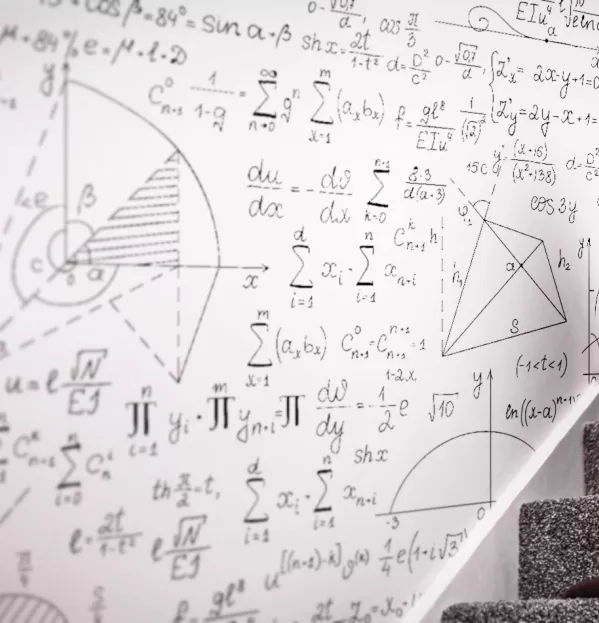
- Home
- Teaching & Learning
- Secondary
- How to counteract maths anxiety in GCSE students
How to counteract maths anxiety in GCSE students

One of the biggest challenges maths teachers face is overcoming the preconception that you are naturally either good or bad at maths. This idea can be incredibly damaging to studentsâ perception of the subject, leading to lack of motivation, particularly around revision.
Unsurprisingly, not revising effectively means that students are more likely to struggle in exams, which only reinforces their belief that they are âbadâ at maths.
So, what can maths teachers do to counteract this?
Itâs important to help students to see the value of revision by making sure they have effective revision strategies to follow that will deliver results and prove to them that they can get better with practice. This work has to start in key stage 3, where we can build the revision habits that will carry students through to their GCSEs and beyond.
As for what those habits are, itâs helpful to start by making sure that students understand what poor revision strategies look like. For example, reading through a textbook is a low-effort approach that allows students to say they are âdoing revisionâ, but this activity doesnât challenge their understanding.
A better strategy would be to read an example, then put the book away and try to reproduce the solution for yourself. This requires much more engagement with the material.
Students need to get used to the idea that doing maths is the only way to learn the subject, and that effective revision must therefore focus on active practice. Giving them clear, simple strategies, like the one above, will help to make their practice more purposeful.
Providing them with recommendations for online resources will also help. We know that students will turn to the internet for revision support but, rather than letting them simply scroll GCSE maths TikTok videos of questionable quality, we can show them how to incorporate reliable resources into an effective revision plan.
How, then, can we communicate all of this to students in a way that will stick? As I mentioned earlier, this work needs to start well before GCSEs, in KS3, and there are three key principles that I think we should follow.
1. Encourage practising little and often
We spend a huge amount of effort optimising our lessons, with varied activities and retrieval practice designed to get the most out of the time in the classroom. But how often do we encourage students to think about how much time they spend mastering what they learn? Perhaps we should be more open about how many hours of practice are required to secure mathematical skills.
In the same way that an instrumental teacher expects their students to practise daily, we should be encouraging regular short bursts of maths practice that are separate from any more extensive pieces of homework. Even 10 minutes a day would make an enormous difference to so many students.
2. Model structured revision
To help students understand what effective revision looks like, we need to show them. We canât leave this work until the run-up to exams; we should be building revision lessons into our teaching throughout the year, during which we model a structure that students can use in their own revision.
For example, the following outline works well:
âDo nowâ: write down key words and concepts about a topic.
Review of prior learning: read or watch an example and then try to do a question of the same type without looking at notes.
Main task: independently work through exam questions, followed by self-marking.
Plenary: write down personal targets for the next revision session.
If you introduce the above structure as early as Year 7, the benefits can be huge.
3. Link performance to effort
We also need to develop studentsâ general skills of independent learning, and help them to recognise the direct link between structured, effective practice and attainment.
This means linking good performance to effort wherever possible. If a student demonstrates good progress or achieves a high score, for instance, make a point to explicitly mention in your feedback to them that you can see their revision is working.
Ultimately, if younger students learn the value of effective revision, they are likely to be more motivated to revise and, hopefully, realise that hard work can make them better mathematicians.
It is important that they have clear strategies to follow here. If they do aimless revision and then perform poorly on a test, they might decide that revision isnât getting them anywhere and isnât worth the effort.
But by helping children to internalise the basics of good revision, we lay the groundwork for them to be successful and to feel more positive - and less anxious - about maths.Â
Stephen Britton is head of mathematics faculty at Ashford School in Kent
Want to keep reading for free?
Register with Tes and you can read five free articles every month, plus you'll have access to our range of award-winning newsletters.
Register with Tes and you can read five free articles every month, plus you'll have access to our range of award-winning newsletters.
Keep reading for just ÂŁ4.90 per month
You've reached your limit of free articles this month. Subscribe for ÂŁ4.90 per month for three months and get:
- Unlimited access to all Tes magazine content
- Exclusive subscriber-only stories
- Award-winning email newsletters
You've reached your limit of free articles this month. Subscribe for ÂŁ4.90 per month for three months and get:
- Unlimited access to all Tes magazine content
- Exclusive subscriber-only stories
- Award-winning email newsletters
topics in this article



